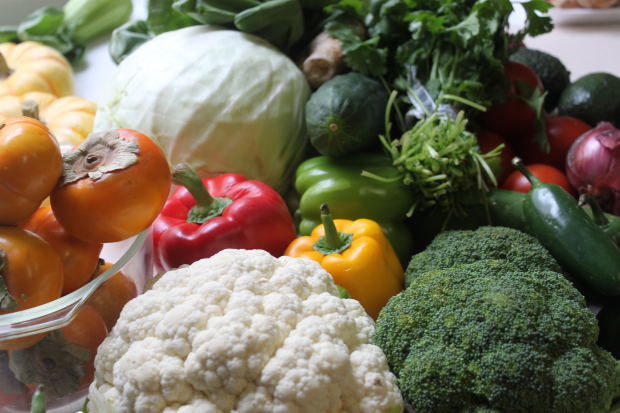I’ve been thinking about Daniel a lot lately. Daniel and his buddies were in the first wave of exiles to Babylon. King Nebuchadnezzar had them brought to the palace and assigned them a daily portion of royal food and wine. But Daniel refused to eat the rations. Why? They were royal, sumptuous.
But they weren’t kosher. Daniel proposed a test – allow him and his fellow Israelites to eat just vegetables and water for ten days to see if there was a difference between them and the Babylonian servants. After ten days, Daniel and the boys looked better! Why just vegetables? Because after inspecting for bugs, vegetables are kosher. Daniel put his religious beliefs before his own comfort and before the mandate of the king.
As Christians, we are called to do the same thing. We are called to put Christ first in our decision making process, and not in a trite WWJD-bracelet kind of way, but in a genuine change-our-behaviors way. We are called to put our religious values first – in the way we treat others, in the way we care for the planet, in the way we vote, in the way we eat.
The film “Harvest of Dignity” opened my eyes to the reality of farm work in North Carolina, and I threw out the challenge that change starts with us. With you. With me. I admit that the problem seemed insurmountable at first. What can I do about this? What influence can one lone shopper have on the system? Well, maybe one lone shopper can’t change the system. But all of us lone shoppers added together form a formidable consumer force.
While conducting research for a different project for the North Carolina Council of Churches, I ran across a statistic that stunned me: According to Carlo Petrini, the founder of Slow Food, Americans throw out 22,000 tons of edible food every day. 22,000 tons! Of edible food! Every day!
Food. Farm workers. Waste. Values. All these ideas swirled around in my mind. And I didn’t quite know what to do.
So I did nothing.
And that was the smartest thing I could have done.
Instead of making my usual Saturday trip to the grocery store, I made a trip to the fridge. I evaluated everything in the refrigerator. There was an entire drawer full of produce (most of which was not seasonal in North Carolina) that was just past its peak. There were little spots developing on the yellow squash and the zucchini felt a little spongy. There was the faintest hint of wrinkles on the bell peppers. The onion was getting soft. The broccoli wasn’t as bright.
If I followed my normal routine, I would have gone to the grocery store and bought fresh veggies – squash, zucchini, bell peppers, onions, broccoli. And I would have come home and thrown out all those slightly-past-their-prime veggies and replaced them with newer models, thus adding my 4 or 5 pounds to the 22, 000 tons of edible food thrown out every day. The next Saturday would roll around and I would do the same thing. Wash. Rinse. Repeat.
So I challenged myself to get by with only what I had in the freezer, fridge, and pantry. I conducted a quick survey and thought through a meal plan. When it comes to breakfast, I’m a creature of habit. Two scrambled eggs. Since I’m living in an apartment building down here while in school, I’m pretty sure a chicken coop would be frowned upon. So eggs can go on the shopping list. I like to take lunch to school with me. I had goat cheese, dried fruit, almonds, and couscous. In less than 10 minutes, I had a week’s worth of lunches prepared and in the fridge.
Since I do eat fairly repetitive meals for breakfast and lunch, I like a nice dinner. I chopped up all the veggies, discarding the wonky bits (I wish my apartment complex composted!), and sautéed a big panful with olive oil and garlic. While that was cooking, I made a pot of barley. I bought a bag of dried barley last year in an effort to incorporate more healthy grains in my diet. I had to dust it off. I divided the veggies up into four portions – one to go into soup made with chicken broth from the pantry and a frozen chicken breast from the freezer. Another portion I mixed with the cooked barley and some pork breakfast sausage patties from the freezer to use as a stuffing for acorn squash. The last portion I refrigerated as-is to add to a jar of store-bought spaghetti sauce and to use as a topping for a fish fillet from a freezer pack.
I love to cook, and I love to eat. Eating healthfully and consciously can also mean eating well.
I haven’t been to the grocery store in over two weeks. I could probably go another two weeks by using frozen vegetables instead of fresh, but this is not about deprivation. It’s about consciousness and conscience.
Daniel refused to eat food that was unclean. He worshipped God with his actions – with every bite. Shouldn’t we do the same?
Rather than making our decisions about food based on what is fastest or most convenient, or even based on what soothes our emotions or temporarily satisfies our palates, shouldn’t we instead worship with our forks? Every mouthful impacts creation. Every bite is an opportunity to worship.
The prophet Isaiah said, “Is this not the fast that I choose: to loose the bonds of injustice, to undo the thongs of the yoke, to let the oppressed go free, and to break every yoke?”
Isn’t this the fast that we should choose?
–Lisa Talbott, Duke Divinity School Intern

